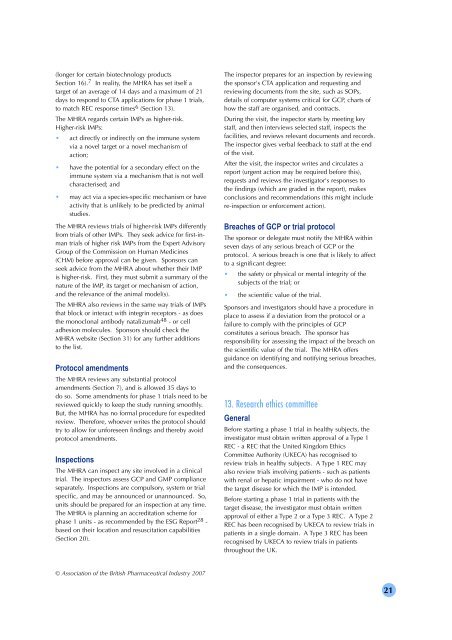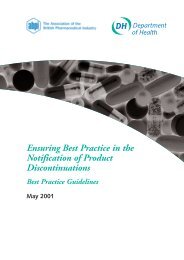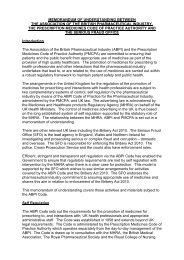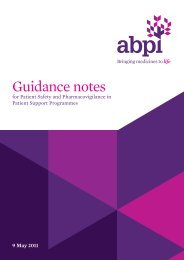ABPI Guidelines for Phase 1 Clinical Trials (PDF
ABPI Guidelines for Phase 1 Clinical Trials (PDF
ABPI Guidelines for Phase 1 Clinical Trials (PDF
Create successful ePaper yourself
Turn your PDF publications into a flip-book with our unique Google optimized e-Paper software.
(longer <strong>for</strong> certain biotechnology products<br />
Section 16). 7 In reality, the MHRA has set itself a<br />
target of an average of 14 days and a maximum of 21<br />
days to respond to CTA applications <strong>for</strong> phase 1 trials,<br />
to match REC response times 6 (Section 13).<br />
The MHRA regards certain IMPs as higher-risk.<br />
Higher-risk IMPs:<br />
• act directly or indirectly on the immune system<br />
via a novel target or a novel mechanism of<br />
action;<br />
• have the potential <strong>for</strong> a secondary effect on the<br />
immune system via a mechanism that is not well<br />
characterised; and<br />
• may act via a species-specific mechanism or have<br />
activity that is unlikely to be predicted by animal<br />
studies.<br />
The MHRA reviews trials of higher-risk IMPs differently<br />
from trials of other IMPs. They seek advice <strong>for</strong> first-inman<br />
trials of higher risk IMPs from the Expert Advisory<br />
Group of the Commission on Human Medicines<br />
(CHM) be<strong>for</strong>e approval can be given. Sponsors can<br />
seek advice from the MHRA about whether their IMP<br />
is higher-risk. First, they must submit a summary of the<br />
nature of the IMP, its target or mechanism of action,<br />
and the relevance of the animal model(s).<br />
The MHRA also reviews in the same way trials of IMPs<br />
that block or interact with integrin receptors - as does<br />
the monoclonal antibody natalizumab 48 - or cell<br />
adhesion molecules. Sponsors should check the<br />
MHRA website (Section 31) <strong>for</strong> any further additions<br />
to the list.<br />
Protocol amendments<br />
The MHRA reviews any substantial protocol<br />
amendments (Section 7), and is allowed 35 days to<br />
do so. Some amendments <strong>for</strong> phase 1 trials need to be<br />
reviewed quickly to keep the study running smoothly.<br />
But, the MHRA has no <strong>for</strong>mal procedure <strong>for</strong> expedited<br />
review. There<strong>for</strong>e, whoever writes the protocol should<br />
try to allow <strong>for</strong> un<strong>for</strong>eseen findings and thereby avoid<br />
protocol amendments.<br />
Inspections<br />
The MHRA can inspect any site involved in a clinical<br />
trial. The inspectors assess GCP and GMP compliance<br />
separately. Inspections are compulsory, system or trial<br />
specific, and may be announced or unannounced. So,<br />
units should be prepared <strong>for</strong> an inspection at any time.<br />
The MHRA is planning an accreditation scheme <strong>for</strong><br />
phase 1 units - as recommended by the ESG Report 28 -<br />
based on their location and resuscitation capabilities<br />
(Section 20).<br />
© Association of the British Pharmaceutical Industry 2007<br />
The inspector prepares <strong>for</strong> an inspection by reviewing<br />
the sponsor's CTA application and requesting and<br />
reviewing documents from the site, such as SOPs,<br />
details of computer systems critical <strong>for</strong> GCP, charts of<br />
how the staff are organised, and contracts.<br />
During the visit, the inspector starts by meeting key<br />
staff, and then interviews selected staff, inspects the<br />
facilities, and reviews relevant documents and records.<br />
The inspector gives verbal feedback to staff at the end<br />
of the visit.<br />
After the visit, the inspector writes and circulates a<br />
report (urgent action may be required be<strong>for</strong>e this),<br />
requests and reviews the investigator's responses to<br />
the findings (which are graded in the report), makes<br />
conclusions and recommendations (this might include<br />
re-inspection or en<strong>for</strong>cement action).<br />
Breaches of GCP or trial protocol<br />
The sponsor or delegate must notify the MHRA within<br />
seven days of any serious breach of GCP or the<br />
protocol. A serious breach is one that is likely to affect<br />
to a significant degree:<br />
• the safety or physical or mental integrity of the<br />
subjects of the trial; or<br />
• the scientific value of the trial.<br />
Sponsors and investigators should have a procedure in<br />
place to assess if a deviation from the protocol or a<br />
failure to comply with the principles of GCP<br />
constitutes a serious breach. The sponsor has<br />
responsibility <strong>for</strong> assessing the impact of the breach on<br />
the scientific value of the trial. The MHRA offers<br />
guidance on identifying and notifying serious breaches,<br />
and the consequences.<br />
13. Research ethics committee<br />
General<br />
Be<strong>for</strong>e starting a phase 1 trial in healthy subjects, the<br />
investigator must obtain written approval of a Type 1<br />
REC - a REC that the United Kingdom Ethics<br />
Committee Authority (UKECA) has recognised to<br />
review trials in healthy subjects. A Type 1 REC may<br />
also review trials involving patients - such as patients<br />
with renal or hepatic impairment - who do not have<br />
the target disease <strong>for</strong> which the IMP is intended.<br />
Be<strong>for</strong>e starting a phase 1 trial in patients with the<br />
target disease, the investigator must obtain written<br />
approval of either a Type 2 or a Type 3 REC. A Type 2<br />
REC has been recognised by UKECA to review trials in<br />
patients in a single domain. A Type 3 REC has been<br />
recognised by UKECA to review trials in patients<br />
throughout the UK.<br />
21









